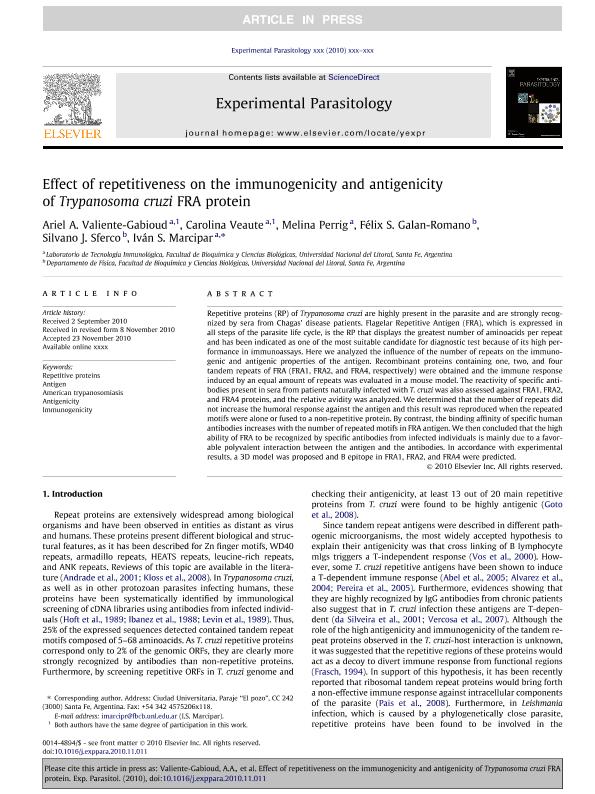Mostrar el registro sencillo del ítem
dc.contributor.author
Valiente Gabioud, Ariel Alejandro

dc.contributor.author
Veaute, Carolina Melania Isabel

dc.contributor.author
Perrig, Melina Soledad

dc.contributor.author
Galan Romano, Félix S.
dc.contributor.author
Sferco, Silvano Juan

dc.contributor.author
Marcipar, Iván Sergio

dc.date.available
2019-04-11T17:59:06Z
dc.date.issued
2011-03
dc.identifier.citation
Valiente Gabioud, Ariel Alejandro; Veaute, Carolina Melania Isabel; Perrig, Melina Soledad; Galan Romano, Félix S.; Sferco, Silvano Juan; et al.; Effect of repetitiveness on the immunogenicity and antigenicity of Trypanosoma cruzi FRA protein; Academic Press Inc Elsevier Science; Experimental Parasitology; 127; 3; 3-2011; 672-679
dc.identifier.issn
0014-4894
dc.identifier.uri
http://hdl.handle.net/11336/74089
dc.description.abstract
Repetitive proteins (RP) of Trypanosoma cruzi are highly present in the parasite and are strongly recognized by sera from Chagas' disease patients. Flagelar Repetitive Antigen (FRA), which is expressed in all steps of the parasite life cycle, is the RP that displays the greatest number of aminoacids per repeat and has been indicated as one of the most suitable candidate for diagnostic test because of its high performance in immunoassays. Here we analyzed the influence of the number of repeats on the immunogenic and antigenic properties of the antigen. Recombinant proteins containing one, two, and four tandem repeats of FRA (FRA1, FRA2, and FRA4, respectively) were obtained and the immune response induced by an equal amount of repeats was evaluated in a mouse model. The reactivity of specific antibodies present in sera from patients naturally infected with T. cruzi was also assessed against FRA1, FRA2, and FRA4 proteins, and the relative avidity was analyzed. We determined that the number of repeats did not increase the humoral response against the antigen and this result was reproduced when the repeated motifs were alone or fused to a non-repetitive protein. By contrast, the binding affinity of specific human antibodies increases with the number of repeated motifs in FRA antigen. We then concluded that the high ability of FRA to be recognized by specific antibodies from infected individuals is mainly due to a favorable polyvalent interaction between the antigen and the antibodies. In accordance with experimental results, a 3D model was proposed and B epitope in FRA1, FRA2, and FRA4 were predicted.
dc.format
application/pdf
dc.language.iso
eng
dc.publisher
Academic Press Inc Elsevier Science

dc.rights
info:eu-repo/semantics/openAccess
dc.rights.uri
https://creativecommons.org/licenses/by-nc-sa/2.5/ar/
dc.subject
American Trypanosomiasis
dc.subject
Antigen
dc.subject
Antigenicity
dc.subject
Immunogenicity
dc.subject
Repetitive Proteins
dc.subject.classification
Otras Biotecnologías de la Salud

dc.subject.classification
Biotecnología de la Salud

dc.subject.classification
CIENCIAS MÉDICAS Y DE LA SALUD

dc.title
Effect of repetitiveness on the immunogenicity and antigenicity of Trypanosoma cruzi FRA protein
dc.type
info:eu-repo/semantics/article
dc.type
info:ar-repo/semantics/artículo
dc.type
info:eu-repo/semantics/publishedVersion
dc.date.updated
2019-03-27T18:05:38Z
dc.journal.volume
127
dc.journal.number
3
dc.journal.pagination
672-679
dc.journal.pais
Países Bajos

dc.journal.ciudad
Amsterdam
dc.description.fil
Fil: Valiente Gabioud, Ariel Alejandro. Consejo Nacional de Investigaciones Científicas y Técnicas. Centro Científico Tecnológico Conicet - Santa Fe; Argentina. Universidad Nacional del Litoral. Facultad de Bioquímica y Ciencias Biológicas. Laboratorio de Tecnología Inmunológica; Argentina
dc.description.fil
Fil: Veaute, Carolina Melania Isabel. Universidad Nacional del Litoral. Facultad de Bioquímica y Ciencias Biológicas. Laboratorio de Tecnología Inmunológica; Argentina
dc.description.fil
Fil: Perrig, Melina Soledad. Universidad Nacional del Litoral. Facultad de Bioquímica y Ciencias Biológicas. Laboratorio de Tecnología Inmunológica; Argentina. Consejo Nacional de Investigaciones Científicas y Técnicas. Centro Científico Tecnológico Conicet - Santa Fe; Argentina
dc.description.fil
Fil: Galan Romano, Félix S.. Universidad Nacional del Litoral. Facultad de Bioquímica y Ciencias Biológicas; Argentina
dc.description.fil
Fil: Sferco, Silvano Juan. Universidad Nacional del Litoral. Facultad de Bioquímica y Ciencias Biológicas; Argentina. Consejo Nacional de Investigaciones Científicas y Técnicas. Centro Científico Tecnológico Conicet - Santa Fe; Argentina
dc.description.fil
Fil: Marcipar, Iván Sergio. Universidad Nacional del Litoral. Facultad de Bioquímica y Ciencias Biológicas. Laboratorio de Tecnología Inmunológica; Argentina. Consejo Nacional de Investigaciones Científicas y Técnicas. Centro Científico Tecnológico Conicet - Santa Fe; Argentina
dc.journal.title
Experimental Parasitology

dc.relation.alternativeid
info:eu-repo/semantics/altIdentifier/url/http://www.ncbi.nlm.nih.gov/pubmed/21118687
dc.relation.alternativeid
info:eu-repo/semantics/altIdentifier/doi/https://doi.org/10.1016/j.exppara.2010.11.011
Archivos asociados
